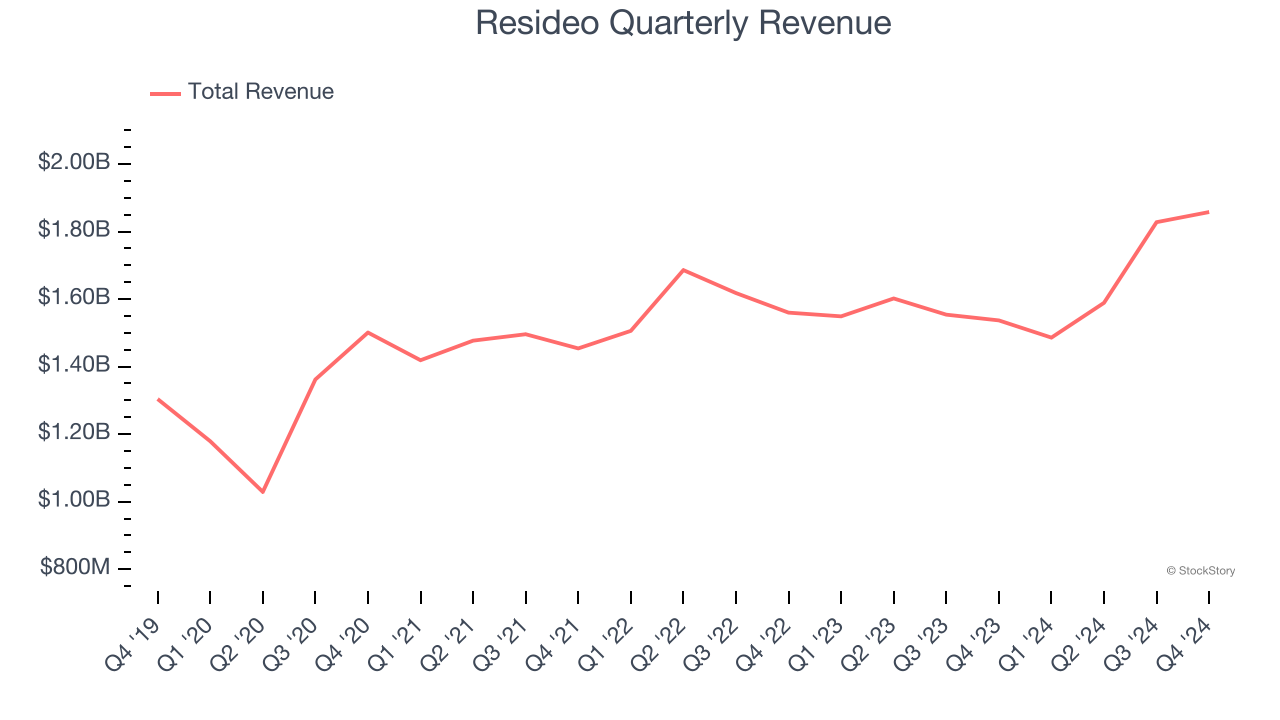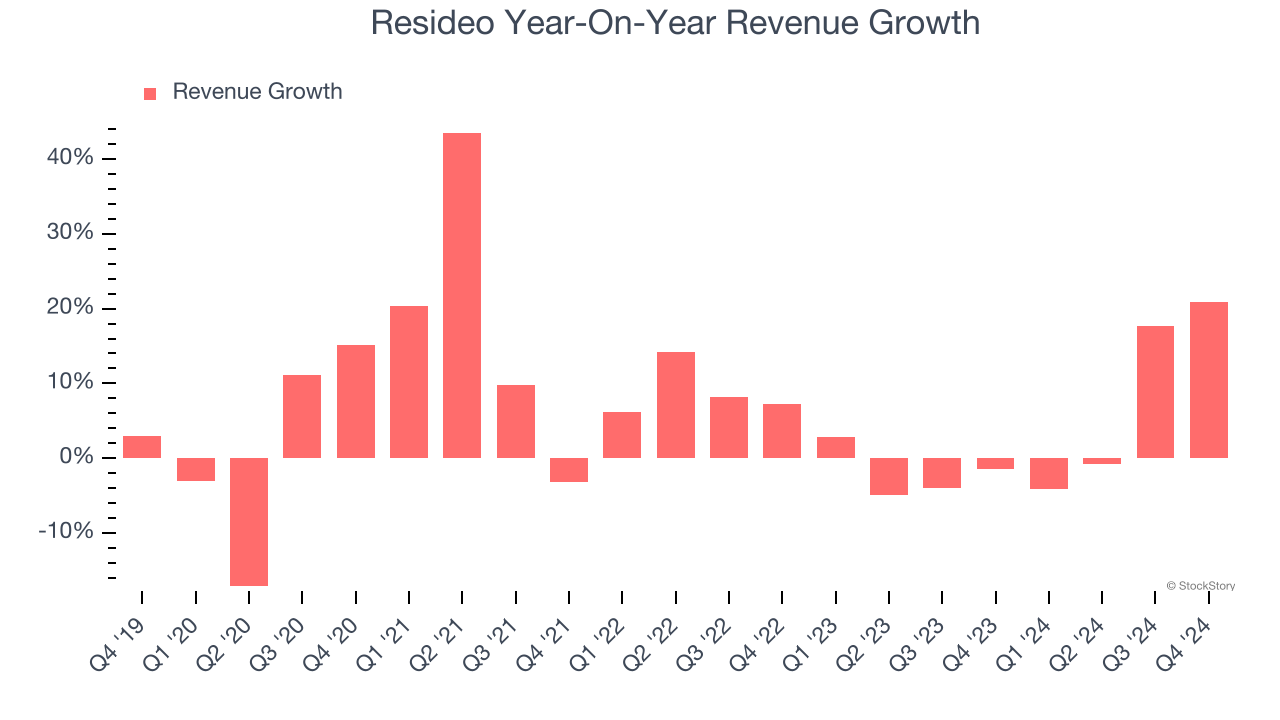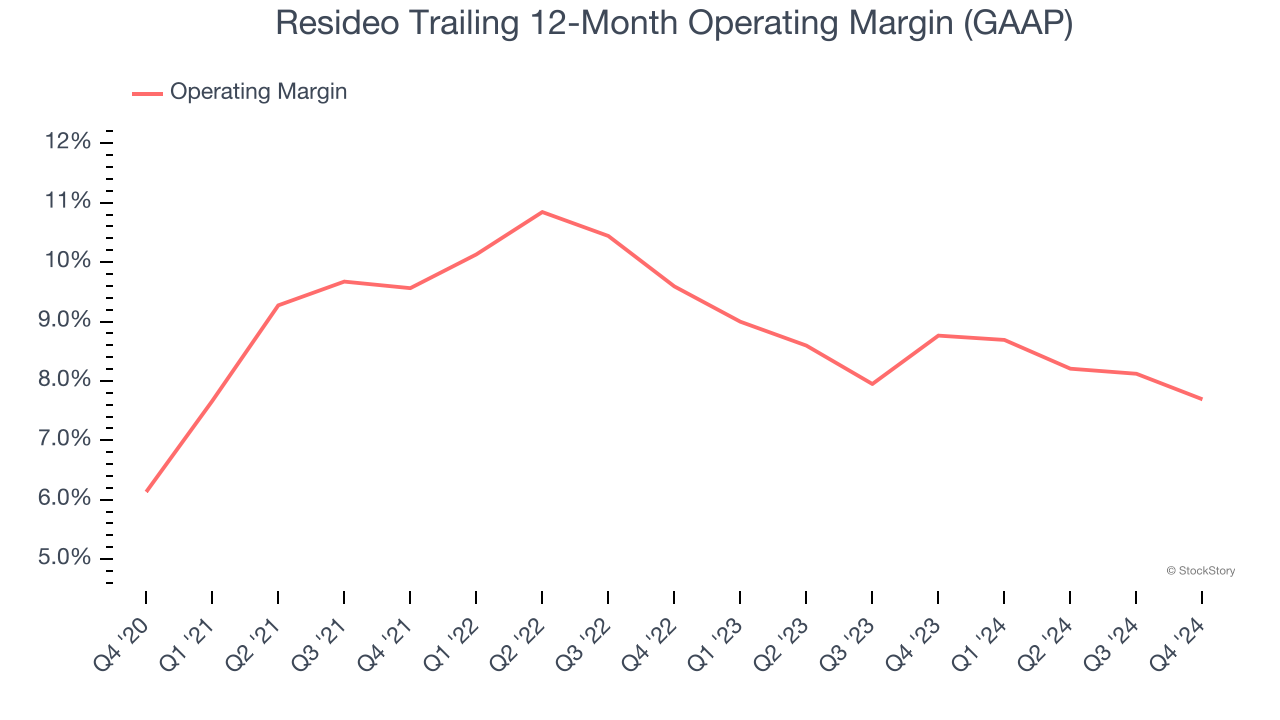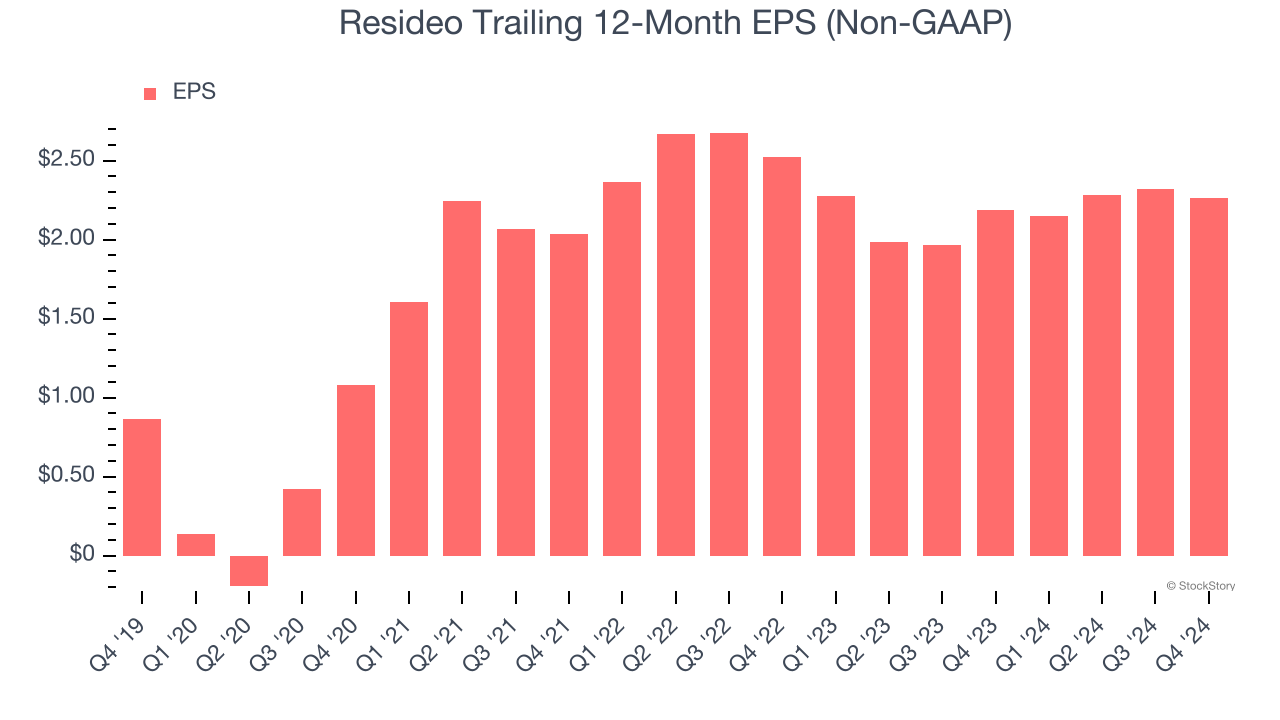
Home automation and security solutions provider Resideo Technologies (NYSE: REZI) reported Q4 CY2024 results exceeding the market’s revenue expectations, with sales up 20.9% year on year to $1.86 billion. The company expects next quarter’s revenue to be around $1.75 billion, close to analysts’ estimates. Its non-GAAP profit of $0.59 per share was 6.3% above analysts’ consensus estimates.
Is now the time to buy Resideo? Find out by accessing our full research report, it’s free.
Resideo (REZI) Q4 CY2024 Highlights:
- Revenue: $1.86 billion vs analyst estimates of $1.84 billion (20.9% year-on-year growth, 1.1% beat)
- Adjusted EPS: $0.59 vs analyst estimates of $0.56 (6.3% beat)
- Adjusted EBITDA: $187 million vs analyst estimates of $187.5 million (10.1% margin, in line)
- Management’s revenue guidance for the upcoming financial year 2025 is $7.39 billion at the midpoint, beating analyst estimates by 0.6% and implying 9.2% growth (vs 8.4% in FY2024)
- EBITDA guidance for the upcoming financial year 2025 is $765 million at the midpoint, below analyst estimates of $774.3 million
- Operating Margin: 7.8%, down from 9.6% in the same quarter last year
- Free Cash Flow Margin: 9.7%, down from 15.1% in the same quarter last year
- Market Capitalization: $3.21 billion
"Resideo finished 2024 in a strong position, exceeding the high-end of the range for all four of our key financial metrics. The ADI and Products and Solutions teams drove excellent operational execution, generating organic net revenue growth in both segments, continued gross margin expansion, healthy Adjusted EBITDA growth, and record operating cash generation," said Jay Geldmacher, Resideo's President and CEO.
Company Overview
Resideo Technologies, Inc. (NYSE: REZI) is a manufacturer and distributor of technology-driven products and solutions for home comfort, energy management, water management, and safety and security.
Building Materials
Traditionally, building materials companies have built competitive advantages with economies of scale, brand recognition, and strong relationships with builders and contractors. More recently, advances to address labor availability and job site productivity have spurred innovation. Additionally, companies in the space that can produce more energy-efficient materials have opportunities to take share. However, these companies are at the whim of construction volumes, which tend to be cyclical and can be impacted heavily by economic factors such as interest rates. Additionally, the costs of raw materials can be driven by a myriad of worldwide factors and greatly influence the profitability of building materials companies.
Sales Growth
Reviewing a company’s long-term sales performance reveals insights into its quality. Any business can have short-term success, but a top-tier one grows for years. Regrettably, Resideo’s sales grew at a mediocre 6.3% compounded annual growth rate over the last five years. This was below our standard for the industrials sector and is a poor baseline for our analysis.

We at StockStory place the most emphasis on long-term growth, but within industrials, a half-decade historical view may miss cycles, industry trends, or a company capitalizing on catalysts such as a new contract win or a successful product line. Resideo’s recent history shows its demand slowed as its annualized revenue growth of 3% over the last two years is below its five-year trend. We also note many other Building Materials businesses have faced declining sales because of cyclical headwinds. While Resideo grew slower than we’d like, it did perform better than its peers. 
This quarter, Resideo reported robust year-on-year revenue growth of 20.9%, and its $1.86 billion of revenue topped Wall Street estimates by 1.1%. Company management is currently guiding for a 17.4% year-on-year increase in sales next quarter.
Looking further ahead, sell-side analysts expect revenue to grow 8.9% over the next 12 months, an improvement versus the last two years. This projection is above the sector average and implies its newer products and services will catalyze better top-line performance.
Software is eating the world and there is virtually no industry left that has been untouched by it. That drives increasing demand for tools helping software developers do their jobs, whether it be monitoring critical cloud infrastructure, integrating audio and video functionality, or ensuring smooth content streaming. Click here to access a free report on our 3 favorite stocks to play this generational megatrend.
Operating Margin
Operating margin is one of the best measures of profitability because it tells us how much money a company takes home after procuring and manufacturing its products, marketing and selling those products, and most importantly, keeping them relevant through research and development.
Resideo has done a decent job managing its cost base over the last five years. The company has produced an average operating margin of 8.4%, higher than the broader industrials sector.
Analyzing the trend in its profitability, Resideo’s operating margin rose by 1.6 percentage points over the last five years, showing its efficiency has improved.

This quarter, Resideo generated an operating profit margin of 7.8%, down 1.8 percentage points year on year. Conversely, its revenue and gross margin actually rose, so we can assume it was recently less efficient because its operating expenses like marketing, R&D, and administrative overhead grew faster than its revenue.
Earnings Per Share
We track the long-term change in earnings per share (EPS) for the same reason as long-term revenue growth. Compared to revenue, however, EPS highlights whether a company’s growth is profitable.
Resideo’s EPS grew at an astounding 21.2% compounded annual growth rate over the last five years, higher than its 6.3% annualized revenue growth. This tells us the company became more profitable on a per-share basis as it expanded.

Diving into Resideo’s quality of earnings can give us a better understanding of its performance. As we mentioned earlier, Resideo’s operating margin declined this quarter but expanded by 1.6 percentage points over the last five years. This was the most relevant factor (aside from the revenue impact) behind its higher earnings; taxes and interest expenses can also affect EPS but don’t tell us as much about a company’s fundamentals.
Like with revenue, we analyze EPS over a shorter period to see if we are missing a change in the business.
For Resideo, its two-year annual EPS declines of 5.3% mark a reversal from its (seemingly) healthy five-year trend. We hope Resideo can return to earnings growth in the future.
In Q4, Resideo reported EPS at $0.59, down from $0.65 in the same quarter last year. Despite falling year on year, this print beat analysts’ estimates by 6.3%. Over the next 12 months, Wall Street expects Resideo’s full-year EPS of $2.26 to grow 6.9%.
Key Takeaways from Resideo’s Q4 Results
It was good to see Resideo narrowly top analysts’ revenue expectations this quarter. We were also happy its EPS outperformed Wall Street’s estimates. On the other hand, its full-year EBITDA guidance slightly missed. Zooming out, we think this was a decent quarter featuring some areas of strength but also some blemishes. The areas below expectations seem to be driving the move, and the stock traded down 2.2% to $21 immediately after reporting.
So should you invest in Resideo right now? What happened in the latest quarter matters, but not as much as longer-term business quality and valuation, when deciding whether to invest in this stock. We cover that in our actionable full research report which you can read here, it’s free.





